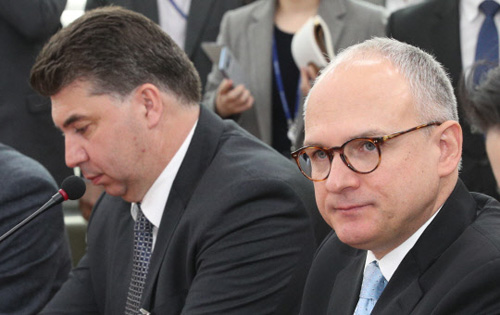GM to pull out’-interest rate up-trade pressure… “Relationship enhancement in priority with US”
[ Kim Dong Wook east@ ] | 2018-02-21 10:49:20
Barry Angle, GM vice president and head of overseas business division (right) and GM president Kaher Kazem visited the National Assembly on the morning of February 20, and are meeting with the head of the ruling camp. Photo by Yunhap news
Especially, a departure from foreign investment capital due to the reversal of the Korea-US interest rate is also a sign of the reality as the US Federal Reserve`s next rate hike is expected to take effect next month.
According to experts in the field of domestic diplomacy and economics on February 20, the US secretariat pointed out that Korea`s economy is becoming a serious risk to the Korean economy, as the pressure on the economy has prompted the withdrawal of Korea`s GM and the Fed`s rate hike.
Economists predict that the trade pressure of the Trump Administration will peak at the moment, before the US midterm elections.
The US has been reviewing measures to impose up to 53 percent tariffs on foreign steel and aluminum products, including South Korea, after triggering safeguard measures (import restrictions) on imports of solar photovoltaics and washing machines last month. In Washington, President Trump is expected to expand pressure on Korea as a whole, including Korea`s main washing machines, steel, televisions and semiconductors. Here, GM is pulling out the closure card of Kunsan factory in full swing, and pushing the Korean economy all directions.
The reversal of interest rates from the United States is also an axis of Sankyo. Goldman Sachs and other major global investors are confident that the Fed will raise interest rates next month as inflation in the US becomes more real. As the pace of interest rate hikes in the US becomes more rapid than expected, it is forecasted that the situation will be resumed in the emerging countries, such as the taper tumbler of 2013, where large-scale foreign capital is being withdrawn.
Diplomatic economists are demanding that Korea should seek to strengthen ties through negotiations rather than face to face with the United States, as the solution to the US ` In particular, it is pointed out that pressure through international organizations such as the World Trade Organization (WTO) is not a wise solution.
Meanwhile, James Kim, a research fellow at Asan Institute for Policy Studies, said, "The US government wants to raise tariffs on Korean products unilaterally or give quotas to export to the United States." The problem is that this is not fair trade or free trade. It will be difficult to accept trade relations. "The key is to protect the US market," said a former senior official at the Ministry of Foreign Affairs, who demanded anonymity. "It is difficult to say that trade law is a side, but legal disputes between the two countries are all solutions."
"Mr. Trump and his administration will have more than 90 % of their diplomatic concerns over how they deal with China in the future," he said. "I wonder where the Korean government, we cannot help but notice."
Sung Tae-yun, a professor of economics at Yonsei University, stated, "Korea is not the most direct target of steel issues and it is a matter of getting caught up in the fight between the United States and China," he advised. In particular, Professor Sung said, "It is an ineffectual measure to come to the WTO to put pressure on US trade."
It is a question of whether the United States does not weigh the multilateral trading system, it takes a long time to reach a final conclusion, and that the US will comply with WTO decisions.
Professor Sung pointed out, "This issue should be solved through collaborative relations while watching the domestic situation in the United States." The problem is that since we have partners, we cannot solve ourselves with our own strength, "We should work together to improve the conditions for companies to export to the US," he mentioned.
By Kim Dong Wook & Lee Mi jung east@



